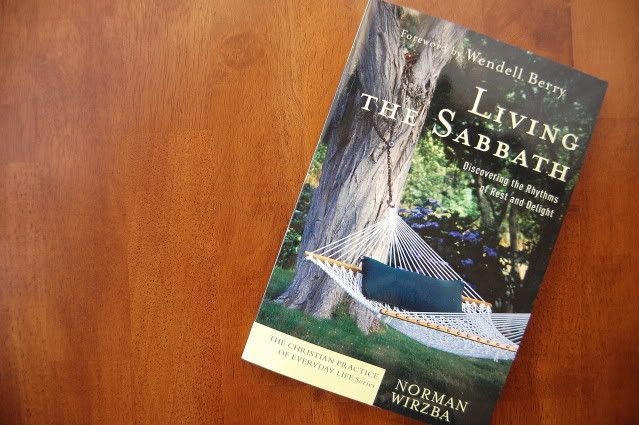-

-

-
I am still quite behind on my weekly book reviews. I read this book the second week of the year. Reviews on my other January books coming shortly, I hope!
-
It is Sunday evening as I write this. I spent the day resting. I slept in somewhat late after a long evening last night. I went to church. I came home and ate and did nothing in particular. I watched a movie with my family. I re-organized my morning room and stared at my books for awhile. I flipped through a few magazines. I prepared and planned for the week ahead. I did some laundry. I read and prayed.
-
One of my resolutions for two thousand and ten was to finish all of my homework by Saturday night each week in order to have a day of complete rest on Sunday. Days like today remind me of how grateful I am to have made this decision
-
(Perhaps I should mention, though, that while it makes for some lovely Sundays, it also makes for some rather miserable Saturdays as I scrunch in all my homework! But at least my sister, who had a lot of homework herself on Saturday, was here to commiserate with me. We found some ways to procrastinate together, though, such as redesigning her blog.)
-
In any case, I picked up Living the Sabbath: Discovering the Rhythms of Rest and Delight by Norman Wirzba two weeks ago in hopes that it would encourage and enlighten my pursuit of seeking sabbath rest. I anticipated the book would discuss the need for setting aside a day of complete rest, but instead I found the book's thesis focused on not just abstaining from work on Sunday, but rather what it looks like to live out the principle of sabbath rest throughout the entire week. Wirzba transforms the Old Testament law of setting aside a single day into a New Testament principle that should characterize our entire lives--one that often goes unnoticed in our modern church, it seems.
-
The main theme that runs throughout the book is the need to slow down, to worship in the ordinary moments, to realize our dependency on God, to see our work as worship, to take delight and pleasure in the gifts of God. As Wirzba writes, "The Sabbath asks us to notice. It compels us to reconsider and question with depth and seriousness what all our striving is ultimately for" (38). Our lives are so often characterized by this endless pursuit for more--more money, more pleasure, more knowledge, more popularity. Wirzba carefully and thoughtfully reminds us that there is another way, that this striving for earthly pleasure is not what God intended for us.
-
At first I questioned how this all related to the Sabbath. The foreword by Wendell Berry and the repeated mentions of environmental issues and the critical analysis of our current food production (in the first chapter, no less) made me skeptical at first; perhaps this author simply has an agenda, I questioned. But the more I read and the more I thought about it and the more I go back over my notes and underlined passages, I am beginning to see the absolute importance of his message from a scriptural perspective.
-
I cannot go into every detail of the book, obviously, but I want to quote one passage that especially stood out to me. In part one, Wirzba discusses the need for Sabbath living and then in part two discusses the practical manifestations of living out the principle of the Sabbath. There is much to mull over throughout the book and I definitely think it merits more than one reading, but the one chapter that struck me more than all the rest was the one on Sabbath worship.
-
Wirzba writes in this chapter, "We have divorced worship too much from our everyday lives and placed it in a purely spiritual realm, not realizing that in doing so we have rendered it abstract and anemic, cut off from the flows and patterns of daily life. Rather than having our worship grow seamlessly and spontaneously (more honestly?) from the activities we perform daily, we have confined it to special buildings and times that are susceptible to the fabrication and hype--the deceit of vainglorious and "empty words" (Eph. 5:6)--of the moment" (159).
-
There are so many other treasures of thought-provoking wisdom in this book and I plan to write more about what I have gleaned and am gleaning from Wirzba's words in the future. But for now, I encourage you to find a copy yourself and sit down prepared to learn. It is not at all what I had expected it to be, but, as so often happens, I found that it is exactly what I needed to hear.
-
Book Information:
Published in 2006 by Brazos Press
165 pages
12 chapters:
---1. Losing Our Way
---2. The Meaning of the Sabbath
---3. From Sabbath to Sunday
---4. The Practice of Delight
---5. The Decline of Delight
---6. Pain and Suffering
---7. Work and the Sabbath
---8. Sabbath at Home
---9. Sabbath Economics
---10. Sabbath Education
---11. Sabbath Environmentalism
---12. Sabbath Worship
Part One: Setting a Sabbath Context | Part Two: The Sabbath in Practical Context
Foreward by Wendell Berry
Preface
Price: $17.09
-
-
It is Sunday evening as I write this. I spent the day resting. I slept in somewhat late after a long evening last night. I went to church. I came home and ate and did nothing in particular. I watched a movie with my family. I re-organized my morning room and stared at my books for awhile. I flipped through a few magazines. I prepared and planned for the week ahead. I did some laundry. I read and prayed.
-
One of my resolutions for two thousand and ten was to finish all of my homework by Saturday night each week in order to have a day of complete rest on Sunday. Days like today remind me of how grateful I am to have made this decision
-
(Perhaps I should mention, though, that while it makes for some lovely Sundays, it also makes for some rather miserable Saturdays as I scrunch in all my homework! But at least my sister, who had a lot of homework herself on Saturday, was here to commiserate with me. We found some ways to procrastinate together, though, such as redesigning her blog.)
-
In any case, I picked up Living the Sabbath: Discovering the Rhythms of Rest and Delight by Norman Wirzba two weeks ago in hopes that it would encourage and enlighten my pursuit of seeking sabbath rest. I anticipated the book would discuss the need for setting aside a day of complete rest, but instead I found the book's thesis focused on not just abstaining from work on Sunday, but rather what it looks like to live out the principle of sabbath rest throughout the entire week. Wirzba transforms the Old Testament law of setting aside a single day into a New Testament principle that should characterize our entire lives--one that often goes unnoticed in our modern church, it seems.
-
The main theme that runs throughout the book is the need to slow down, to worship in the ordinary moments, to realize our dependency on God, to see our work as worship, to take delight and pleasure in the gifts of God. As Wirzba writes, "The Sabbath asks us to notice. It compels us to reconsider and question with depth and seriousness what all our striving is ultimately for" (38). Our lives are so often characterized by this endless pursuit for more--more money, more pleasure, more knowledge, more popularity. Wirzba carefully and thoughtfully reminds us that there is another way, that this striving for earthly pleasure is not what God intended for us.
-
At first I questioned how this all related to the Sabbath. The foreword by Wendell Berry and the repeated mentions of environmental issues and the critical analysis of our current food production (in the first chapter, no less) made me skeptical at first; perhaps this author simply has an agenda, I questioned. But the more I read and the more I thought about it and the more I go back over my notes and underlined passages, I am beginning to see the absolute importance of his message from a scriptural perspective.
-
I cannot go into every detail of the book, obviously, but I want to quote one passage that especially stood out to me. In part one, Wirzba discusses the need for Sabbath living and then in part two discusses the practical manifestations of living out the principle of the Sabbath. There is much to mull over throughout the book and I definitely think it merits more than one reading, but the one chapter that struck me more than all the rest was the one on Sabbath worship.
-
Wirzba writes in this chapter, "We have divorced worship too much from our everyday lives and placed it in a purely spiritual realm, not realizing that in doing so we have rendered it abstract and anemic, cut off from the flows and patterns of daily life. Rather than having our worship grow seamlessly and spontaneously (more honestly?) from the activities we perform daily, we have confined it to special buildings and times that are susceptible to the fabrication and hype--the deceit of vainglorious and "empty words" (Eph. 5:6)--of the moment" (159).
-
There are so many other treasures of thought-provoking wisdom in this book and I plan to write more about what I have gleaned and am gleaning from Wirzba's words in the future. But for now, I encourage you to find a copy yourself and sit down prepared to learn. It is not at all what I had expected it to be, but, as so often happens, I found that it is exactly what I needed to hear.
-
Book Information:
Published in 2006 by Brazos Press
165 pages
12 chapters:
---1. Losing Our Way
---2. The Meaning of the Sabbath
---3. From Sabbath to Sunday
---4. The Practice of Delight
---5. The Decline of Delight
---6. Pain and Suffering
---7. Work and the Sabbath
---8. Sabbath at Home
---9. Sabbath Economics
---10. Sabbath Education
---11. Sabbath Environmentalism
---12. Sabbath Worship
Part One: Setting a Sabbath Context | Part Two: The Sabbath in Practical Context
Foreward by Wendell Berry
Preface
Price: $17.09
-


Thanks for posting this, dear! I'm putting it on my "to read list".
ReplyDelete